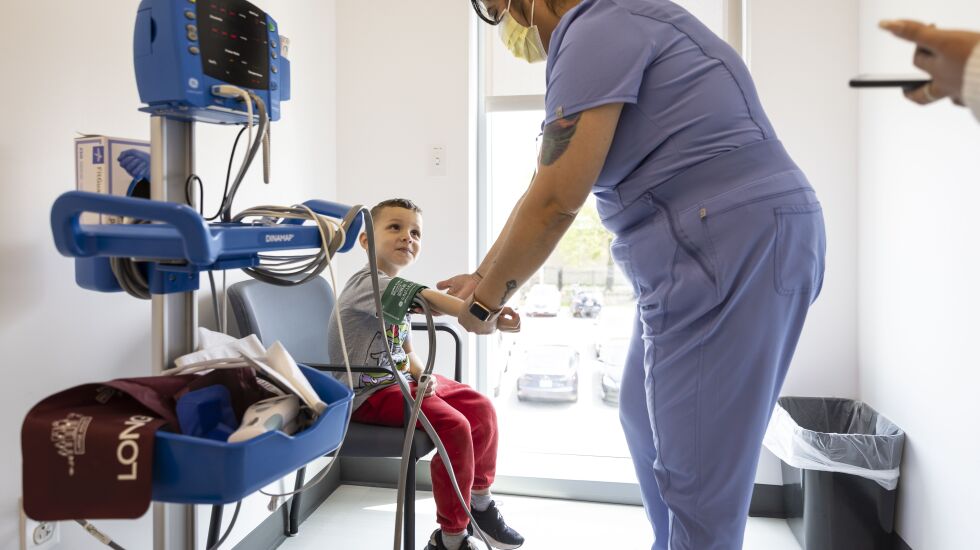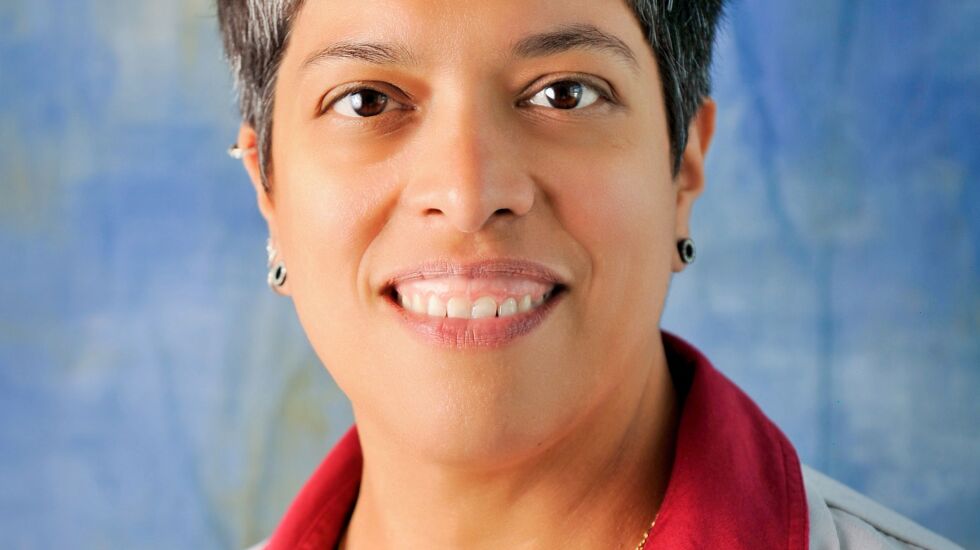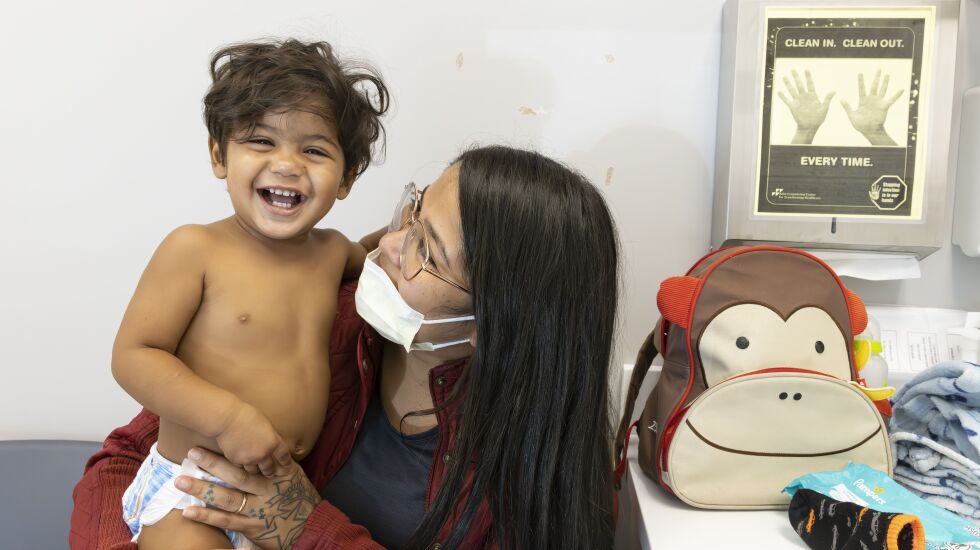
Migrants sent to Chicago since late summer often arrive with very little — little food, few possessions, and for many, little or no access to health care for as long as they can remember despite their perilous journeys.
Dr. Denise Cunill recalled one such family of four who arrived at Cook County Health’s new clinic for asylum seekers in September with used flip-flops on their feet.
As Cunill prepared to give a routine exam and asked the kids to put on gowns, the teenager among them apologized — she hadn’t showered, she told the doctor. But she was grateful for the care. The teen couldn’t recall the last time she had seen a doctor, Cunill recalled, tearing up at the memory.
Taking care of immigrants like this family — a core mission of Cook County Health — “has enveloped my soul,” said Cunill, herself the daughter of an immigrant.
Cunill lays out how the health system has tended to the rapid flow of migrants to Chicago: immunizations to ready kids new to this country for school, medication for wounds and chronic conditions that have been untreated, and even surgery.

A pediatrician for 25 years, Cunill said she’s long taken care of the migrant population, but not at this volume. Providers are seeing about 60 to 90 patients a day, nearing capacity for the county’s clinic.
The pressure is about to build.
About nine months into operating the clinic for asylum seekers, Cook County Health is bracing for a financial storm of sorts, facing at least a $40 million drop in revenue this year.
A number of financial woes are colliding. There’s the cost of running the migrant clinic and the possibility more health services will be needed as this population continues to swell. The state stopped contributing money to the clinic in February.
And now the county is bracing for a deluge of low-income patients losing their public Medicaid health insurance, yet still needing treatment but with perhaps no way to pay. That’s because after a three-year pause during the pandemic, the state is back to requiring that people prove they qualify for Medicaid.
‘We’re going to do what we have to do’
Cook County Health CEO Israel Rocha Jr. and his team are heading into the 2024 budget season and taking all this into account.
“We’re not in the position of saying we’re not going to care for people who are at our doors,” Rocha said at a recent media briefing. “We’re going to do what we have to do, but it does come with a consequence and a cost.”
Cook County Health is one of the biggest public health systems in the nation, with a legacy and a mission to treat patients whether they can pay or not.
It’s a place where immigrants have long sought care, often seeing themselves reflected in the doctors and nurses who treat them. The health system includes two hospitals — flagship John H. Stroger Jr. on the Near West Side and Provident on the South Side — and a network of clinics that ring the city and suburbs.
Some 10,000 migrants have been sent to Chicago since late summer.
Cook County Health’s Northwest Side clinic is the main medical provider for the migrants, typically tending to them a day or two after they arrive in the city. So far, the clinic has treated more than 6,500 migrants. Nearly 30% have been children.

At the clinic on a recent day, the waiting area was packed with people awaiting appointments.
Paola Anez, 26, who is pregnant, spent part of the afternoon there with her 5-year-old daughter. Through a translator, she described an eight-month journey from Peru to Chicago, trekking through jungles, being deported and crossing the Rio Grande in desperation before being arrested.
On this day, they received medical check-ups and vaccinations.
“They did all types of tests,” Anez said through a translator. “They did everything, all types of checks on me.”
Now she, her daughter and husband are staying at a refugee center after spending two weeks at a Chicago police station, sleeping on the floor.
The county has so far spent about $20 million on the clinic, which includes staffing, screenings and treatment on-site, as well as for patients who need more specialized care at Stroger Hospital.
The state, however, stopped covering the cost of typically expensive temporary nurses at the clinic. A spokeswoman for Gov. J.B. Pritzker did not respond to questions.
’ I remain an optimist’
County Board President Toni Preckwinkle has personally lobbied state lawmakers in Springfield for at least $28 million to cover the rest of the state’s fiscal year through June 30 and next year’s costs. The county is expecting even more asylum seekers in the months to come.
Next year’s proposed state budget does include about $42 million dollars to help Chicago and Cook County with asylum seekers, but it’s not clear how much would go to either.
Meanwhile, Cook County Health doesn’t know how many people may lose Medicaid coverage, but says it could translate to a roughly $40 million loss.
This all comes as the health system in the last five years made progress on improving its bottom line. The county had reduced by about 60% — or $345 million — the amount of medical care it provided without getting reimbursed for it, after sounding the alarm bells for years over the rise of what’s called uncompensated care. Much of the steep decline is due to COVID-19: The public was implored to steer clear of hospitals to make room for patients sick with the virus, while more people qualified for and remained on Medicaid.

In an interview with WBEZ, Rocha said he’s looking at what expensive projects or hires could be delayed to compensate for the brewing financial shortfall. For example, there are plans to expand cancer treatment with pricey imaging equipment that may have to be put on hold.
The projected shortfall in Medicaid funding alone translates to the salaries of some 160 physicians or 400 nurses, an example of how far $40 million goes at Cook County Health, where staffing is already challenged, Rocha said. Not having enough providers could ripple down to patients, he said.
The health system hopes to absorb some of the $40 million loss.

There are some bright spots. The health system expects to receive nearly $7 million from the state for asylum seekers who are eligible for Illinois health insurance programs, including one for undocumented immigrants.
When asked if he would seek from the county funding beyond an annual subsidy the health system typically receives, Rocha wouldn’t say just yet.
“I remain an optimist,” Rocha said. “I hope that the story of the work we’re doing and the acknowledgement of the impact that it has for our community … would encourage people to want to support us.”
Kristen Schorsch covers public health and Cook County for WBEZ.







